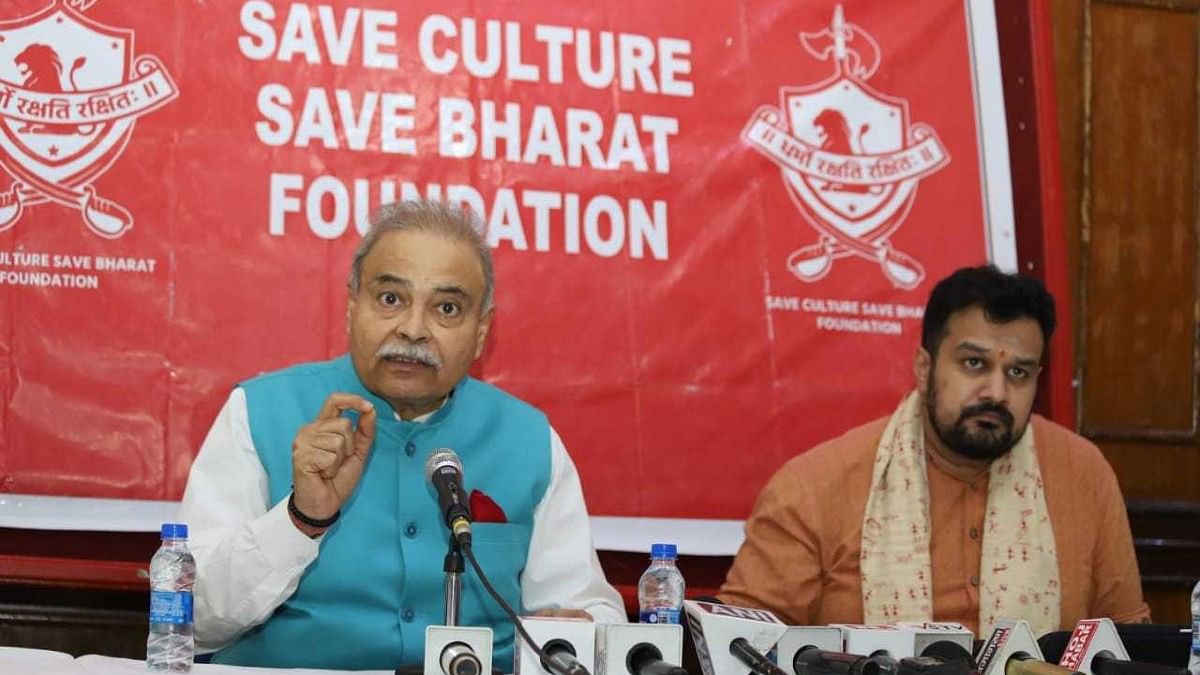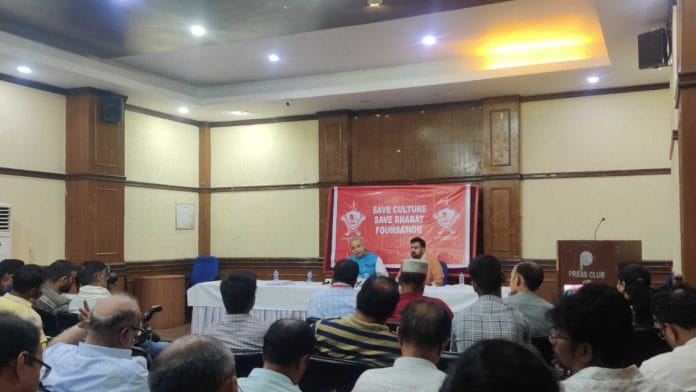New Delhi: Microblogging site X (formerly Twitter) and OTT platform Netflix are promoting “sexually explicit content and waging a war against India’s culture and character”, and these content creators are not just “cultural terrorists” but “worse than foreign invaders”. These allegations were made by journalist Uday Mahurkar, founder of the Save Culture Save Bharat foundation who has called on the government to ban both X and Netflix.
In a press conference Monday, Mahurkar said he believes these platforms are inundating the digital landscape with explicit content that violates the POCSO Act and threatens the nation’s moral integrity.
Advocate Vishnu Shankar Jain, who is also representing the Hindu side in the Gyanvapi case, joined Mahurkar in this call to action. The foundation has also enlisted the support of other influential personalities including RSS chief Mohan Bhagwat, Yoga guru Ramdev, Patanjali Ayurved Ltd MD Balkrishna and Nirbhaya’s mother Asha Devi.
Quoting an interview of American serial killer Ted Bundy and citing instances including one of a school principal raping minors after watching porn, Mahurkar kicked off the press conference by talking about how “pornographic content is the main instigator of rape”.
“Our Prime Minister has set a precedent that makes us aggressive on the global stage. Many countries now view us differently. In a short period, we have become an economic, military, and international superpower. However, the respect we are receiving as a superpower will be lost if we don’t stop this,” he said.

According to him, the objective of the Save Culture Save Bharat foundation is clear: to defend India’s cultural soul from the onslaught of explicit digital content, ensuring that its future remains bright and rooted in its proud traditions.
As the foundation sees it, safeguarding cultural integrity is not just a legal obligation but a necessary step for India to truly emerge as a global superpower.
“Picture India as a Vishwaguru by 2047,” Mahurkar implores, “only to see our cultural essence eroded by unchecked digital obscenity.”
To support their argument about graphic nudity, sexual acts, and explicit depictions, the panel then presented a booklet as “evidence” — stills from 101 movies and OTT series available on Netflix. The stills, complete with timestamps, were scenes from popular titles like Sacred Games, Bridgerton, Margarita with a Straw, and Sex Education, among others.
ThePrint reached Netflix and X via email for comment but had not received a response by the time of publication. This report will be updated if and when a response is received.
According to Ormax OTT Audience Report 2023, the size of India’s ‘OTT Audience Universe’ stood at 48.11 crore last year, marking a growth of 13.5 percent compared to 2022. Of the 48.11 crore, 3.64 crore had paid for at least one subscription service directly.
Additionally, India ranked third in terms of Twitter users, with 2.73 crore active users on the platform in 2023.
At the same time, a 2023 report by the Internet and Mobile Association of India (IAMAI) and London-based market research firm Kantar said that India has more than 82.1 crore internet users. Of these, 86 percent use the internet for OTT (audio + video) consumption.
Also Read: 128 Indian startups write to TRAI, protest telcos’ demand to make OTT apps pay network usage fees
‘Netflix threatening to tear apart India’s roots’
During the press conference this week, Mahurkar declared that India cannot become a Vishwaguru by 2047 if it remains a “culturally poor nation”.
He claimed to have met Defence Minister Rajnath Singh and former Union minister Anurag Thakur to voice the concerns raised by the Save Culture Save Bharat foundation.
In a letter addressed to the Secretary of the Ministry of Information and Broadcasting earlier this month, Mahurkar accused Netflix of “threatening to tear apart India’s roots and rich cultural heritage by dishing out pornographic content under the guise of entertainment and freedom of speech”.
He held Netflix solely accountable, arguing that parents cannot be blamed, given the socio-educational-economic profile of most Indian mobile users and that children have become victims of their guardians’ technological incapability or lack of education. Hence, his solution is to nip this issue in the bud by calling for an immediate ban on Netflix in India.
On its part, Netflix displays maturity ratings for all content streamed on the platform. According to its website, these ratings are either set by Netflix or by a local standards organisation based on presence and impact of elements like violence, sexual content, adult language, nudity, or substance use. Detailed information is provided when applicable.
These prominently displayed ratings help viewers make informed choices based on the age-appropriateness of the content.
However, TV and movie ratings may vary by region. For instance, in India, “U” indicates content suitable for children and persons of all ages, while “U/A 7+” is suitable for children aged 7 and above and suitable for children under the age of 7 only with adult supervision.
Similarly, “U/A 13+” is recommended for teens aged 13 and above, and parental guidance is advised for those younger; “U/A 16+” is recommended for teens aged 16 and above; and “A” denotes content restricted to adults.
In March this year, the government banned 18 OTT platforms, 19 websites, 10 apps and 57 social media accounts for showing obscene and pornographic content in violation of the Rules for Information Technology Act, 2000. Then I&B minister Anurag Singh Thakur had stressed at the time that streaming platforms must refrain from promoting obscenity, vulgarity, and abuse under the pretext of ‘creative expression’.
But will a blanket ban effectively address the concerns raised by the Save Culture Save Bharat foundation without slipping into the realm of moral policing?
In response to this question by ThePrint, Vishnu Shankar Jain maintained that this was not a moral policing issue.
“We are not asking anyone to check what they are wearing. We are not going into that arena. We are only saying that our youth, our child, when they are accessing their mobile, when they are accessing their iPad, in today’s digital era, every child is very much accessible to laptops, mobiles, iPads. In this kind of era, if there is no check so far as these kinds of contents are [sic] concerned, it is a direct offence and violation of section 11 sub clause 3 of the POCSO Act,” he said.
Section 11, sub clause 3 of the POCSO Act, states that a person is said to commit sexual harassment upon a child when such person with sexual intent shows any object to a child in any form or media for pornographic purposes.
Jain felt that the IT rules 2021 are inadequate in curbing obscene content. Therefore, he, along with Mahurkar, proposed incorporating provisions in The Digital India Act 2023 to immediately ban “sexually perverted” content and platforms.
They also suggested implementing an ethics code for all audiovisual platforms and setting up a “national content control authority” with judicial or quasi-judicial powers to make India the “world’s first sexually perverted content-free nation”.
(Edited by Amrtansh Arora)
Also Read: Netflix chose fear over fact. Removing ‘Annapoorani’ only feeds the bully






